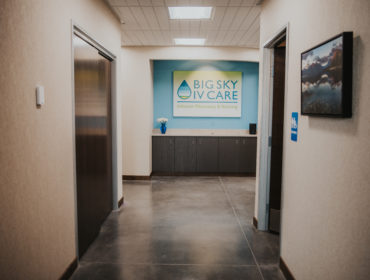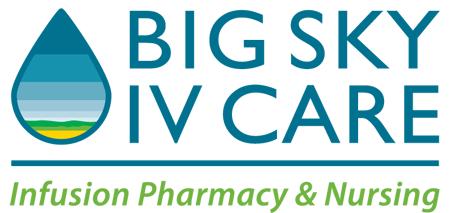Medicare/Insurance FAQ's
Our office will call your insurance, verify your benefits, and verify if your deductible is met and if you have an out of pocket amount that you need to meet before your insurance pays in full. Big Sky IV Care will notify you of your estimated charges and out of pocket amounts at the start of your therapy
Heightened emphasis on cost-containment in health care, as well as developments in the clinical administration of the therapy, led to strategies to administer infusion therapy in alternate settings. For individuals requiring long-term therapy, inpatient care is not only tremendously expensive but also prevents the individual from resuming normal lifestyle and work activities.
The technological advances that enabled safe and effective administration of infusion therapies in the home, the desire of patients to resume normal lifestyles and work activities while recovering from illness, and the cost-effectiveness of home care are important. Consequently, home infusion therapy has evolved into a comprehensive medical therapy that is a much less costly alternative to inpatient treatment in a hospital or skilled nursing facility.
Home infusion has been proven to be a safe and effective alternative to inpatient care for many disease states and therapies. For many patients, receiving treatment at home or in an outpatient infusion suite setting is preferable to inpatient care. A thorough patient assessment and home assessment are performed before initiating infusion therapy at home to ensure that the patient is an appropriate candidate for home care.
Please call us with financial concerns, we will work with you.
Big Sky I.V. Care is familiar with Medicare’s coverage details and will advise prospective patients of their specific coverage and anticipated out-of-pocket obligations should they undertake home infusion therapy.
Unfortunately, Medicare’s fee-for-service program (Parts A, B and D) is the only major health plan in the country that has not recognized the clear benefits of adequately covering provision of infusion therapies in a patient’s home. Because most Medicare beneficiaries are enrolled in the fee-for-service program, when seniors and the disabled find they may need infusion therapy they often find it unaffordable to receive this care in the comfort of their home.
Providing home infusion therapy involves not only the delivery of medication, but also requires professional services, specialized equipment and supplies to ensure safe and effective administration of the therapy. While most infusion drugs may be covered by the Medicare Part D prescription drug benefit, the Centers for Medicare & Medicaid Services (CMS) has determined that it does not have the authority to cover the infusion-related services, equipment and supplies under Part D. As a result, many Medicare beneficiaries are effectively denied access to home infusion therapy and are being forced into receiving infusion therapy in hospitals and skilled nursing facilities at a significantly higher cost to Medicare and at great inconvenience to the patients. National Home Infusion Association or NHIA is underway with a critical legislation initiative to rectify this situation.
In Medicare Part B, there is some coverage for certain therapies administered using durable medical equipment (a mechanical or electronic external infusion pump). Unfortunately, only a select few therapies are covered and only under very specific conditions. These include some anti-infective, some chemotherapy drug, some inotropic therapies (e.g., dobutamine), some pain management, immune globulin administered subcutaneously, and a few other therapies. For parenteral and enteral nutrition therapies, there can be coverage in Part B only if the need for the therapy is documented to be for at least 90 days and other coverage criteria are met. There may be coverage for intravenous immune globulin (IVIG) for primary immune deficiency patients but the supplies and equipment are not paid for. More specific information can be obtained by contacting the Medicare entities called Durable Medical Equipment Medicare Administrative Contractors (DME MACs). The coverage criteria for home infusion that all contractors follow are found from a DME MAC.
For home nursing visits needed for beneficiaries receiving infusion therapy, there can be Medicare Part A coverage under Medicare’s home health benefit only if the patients are serviced by a Medicare-certified home health agency, as well as considered to be homebound and in need of intermittent (not 24 hour) home nursing. NHIA’s Medicare legislation initiative is intended to broaden this gap in coverage too.
Some Medicare fee-for-service plan patients may have other insurance that will pick up some of the home infusion costs not covered by Medicare. A minority of the Medicare population is enrolled in the Medicare Advantage (Part C) program. Similar to most commercial health plans, many Medicare Advantage health plans cover home infusion because they recognize it will reduce their overall health care costs and achieve high levels of patient satisfaction.
To Ensure Safe And Proper Administration Of Infusion Drugs Big Sky I.V. Care Infusion Pharmacy Provides An Extensive Array Of Professional Services:
* Comprehensive assessment that considers patient history, current physical and mental status, lab reports, cognitive and psychosocial status, family/care partner support, prescribed treatment, concurrent oral prescriptions, and over-the-counter medications.
* Maintenance of appropriate procedures for the compounding and distribution of sterile infusion products as outlined in the national standards and state and federal regulations.
* Drug interaction monitoring and identification of potential drug, dose or drug catheter incompatibilities.
* Comprehensive admission procedures that include patient education of medical and disposable equipment use, medication storage and handling, emergency procedures, vascular access device management, recognition and reporting of adverse drug reactions.
* Comprehensive care planning that considers actual or potential drug or equipment-related problems, therapy monitoring with specific patient goals, and coordination of activities with other providers such as home health agencies and physicians.
* Ongoing patient monitoring and reassessment activities to continually assess for response to treatment, drug complications, adverse reactions, and patient compliance.
* Laboratory report reviews, as applicable, and subsequent consults with care professionals to adjust medication orders if necessary.
* Maintenance of appropriate physical facilities for storage, preparation, dispensing, and quality control of all infusion medications and equipment.
* Ongoing employee education and competence validation activities.
* Performance improvement programs that include collection of clinical outcomes data, patient perception data, trending and analysis of these and other performance measurement data, and root cause evaluations of all sentinel event
Our Clinic

